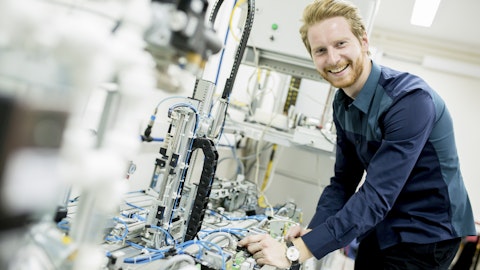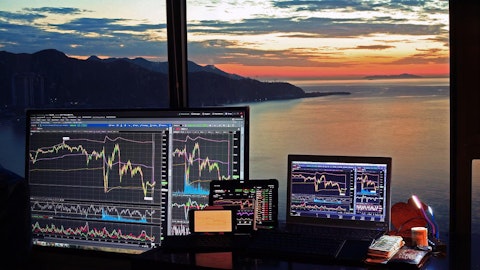Photronics, Inc. (NASDAQ:PLAB) Q3 2023 Earnings Call Transcript September 6, 2023
Photronics, Inc. misses on earnings expectations. Reported EPS is $0.44 EPS, expectations were $0.52.
Operator: Good day and thank you for standing by. Welcome to the Photronics Third Quarter Fiscal Year 2023 Earnings Call. At this time all participants are in a listen-only mode. After the speaker’s presentation there will be a question-and-answer session. [Operator Instructions]. Please be advised that today’s conference is being recorded on Wednesday, September 6, 2023. I would now like to turn the conference over to Richelle Burr, Chief Administrative Officer. Please go ahead.

Dragon Images/Shutterstock.com
Richelle Burr: Thank you, Michelle. Good morning, everyone. Welcome to our review of Photronics fiscal 2023 third quarter results. Joining me this morning are Frank Lee, our Chief Executive Officer; John Jordan, our Chief Financial Officer; Chris Progler, our Chief Technology Officer; and Eric Rivera, our Chief Accounting Officer and Corporate Controller. The press release we issued earlier this morning, together with the presentation material that accompanies our remarks, are available on the Investor Relations section of our web page. Comments made by any participants on today’s call may include forward-looking statements that include such words as anticipate, believe, estimate, expect, forecast, and in our view. These forward-looking statements are based upon a number of risks, uncertainties, and other factors that are difficult to predict.
Actual results may differ materially from those expressed or implied, and we assume no obligation to update any forward-looking information. During the course of our discussion, we will refer to certain non-GAAP financial metrics. These numbers are useful for analysts, investors and management to evaluate ongoing performance. A reconciliation of these metrics to GAAP financial results is provided in our presentation materials. At this time, I will turn the call over to Frank.
Frank Lee: Thank you, Richelle, and good morning, everyone. Our team did a great job in the third quarter maintaining margin and improving cash flow even while we experienced slightly softer demand. Revenue during the quarter was $224 million, 2% better than last year’s third quarter, sequentially 2% lower than the record of $229 million set in our previous quarter. Looking at the full year-to-date, revenues are up 8% compared to last year. At the midpoint of the revenue range in our Q4 guidance, we are on track to achieve our sixth consecutive year of record revenue. We continue to deliver consistent financial performance against the backdrop of an extended semiconductor downturn. Profitability has improved year-to-date with gross margins up 3% from last year and operation margins up nearly 4%.
Turning to the IC business. High-end IC revenue was up from Q2 as demand increased from foundry customer in Asia. At the same time, reduced mainstream demand in Asia caused our overall IC revenue to fall slightly. We believe we have maintained market share. Our geographic presence and the broad technologies have positioned the company well to continue to grow as market demand improves. FPD saw continued growth in high-end AMOLED mass for mobile display. This was offset by declines in photomask for G10.5+ and LTPS displays. AMOLED usage is expanding into large performing high-end tablet, laptop, and automotive sectors while increasing penetration into smartphones. We also see emerging panel makers attempt to gain market share by reducing new AMOLED designs.
In future years, another positive trend will be the production of AMOLED panels on G8.6 size glass. This product will require a new level of high-quality and superior photomask, favoring Photronics technology leadership position. We are confident in our ability to continue to win business with these advanced technologies. The strong AMOLED demand and continued mainstream business kept our FPD fab operation at high utilization levels in Q3, and we expect to maintain the trend into Q4. We overcame overall moderately lower revenue by further controlling costs and optimizing our product mix. That enabled us to maintain growth and operation margins in line with the record levels set in Q2. In addition, our customer long-term agreements helped us preserve the ASP and Fab utilization rate.
As a result, we earned $0.44 per share on a GAAP basis and $0.51 per share on a non-GAAP basis. Recovery in our global semiconductor industry seems to be slower than previously anticipated due to continued macroeconomic uncertainty and mute consumer demand. However, on the positive side, IC design intensive industry trend should be a positive driver for Photomask growth. Technologies such as AI, data center, IoT, automotive, industrial and machine learning will continue to drive chip makers to release design for many varieties of new ICs. Since each design requires a unique set of Photomask to launch this IC product, this will drive demand for both high-end and mainstream business. Additionally, unruly [ph] trend are supporting expanding investment in global semiconductor manufacturing capacity across multiple nodes.
[Indiscernible] projects are under construction of plants in Asia, North America and Europe to help each region manage their semiconductor supply chain. Consequently, we also expect this additional capacity to drive more global demand for Photomask. Our financial discipline, capital allocation strategy, and careful cash balance sheet management, support our long-term growth initiative to take advantage of these trends. The priority of Photronics capital allocation strategy has been to invest in profitable organic growth. We believe our ability to outgrow the IC market and win Photomask share result from the target capital investment. All of the above factors give us confidence that Photomask demand will continue to grow over the long-term. And Photronics is uniquely positioned to benefit from this growth opportunities.
2023 is on track to be another great year for Photronics and the company is performing well even under a difficult industry environment. I have full confidence in our ability and I am optimistic that we will be able to grow revenues, expand margins, and deploy capital to continue creating shareholder value. With that, I will turn the call over to John.
John P. Jordan: Thank you, Frank. Good morning, everyone. Our guidance for third quarter anticipated revenue is essentially flat with Q2. Revenue for the quarter of $224 million was at the low end of that guidance, an increase of 2% over last year’s Q3 and 2% off the Q2 quarterly record of $229 million. Both IC and FPD were off the Q2 result by that same percentage. A lag in anticipated orders was the primary cause of the lower revenue. We anticipate the Q4 order rate to be somewhat better as reflected in our Q4 guidance we’ll discuss later. Consistent with the countercyclical nature of the Photomask industry we’ve discussed in the past, Photronics revenue has remained relatively strong in the face of a sustained industry downturn.
IC revenue of $163.1 million was down 2% sequentially. High-end revenue increased sequentially despite weakness in memory on strong foundry logic demand in Asia. Mainstream IC demand was more tempered but the overall supply demand dynamic and the long-term purchase agreement structure continued to support favorable pricing. And together with our understanding of the industry outlook, supplemented with post collaboration with our customer strategies, helped inform where our investments are targeted. The expansion of our Taiwan and China IC facilities will provide the added capacity to continue fueling growth in our IC business in that region. FPD revenue was also down 2% from the record-setting second quarter level. Although AMOLED business to supply mobile demand continues strong, high-end overall declined as the AMOLED growth was offset by fewer LTPSNG 10.5+ masks.
We continue to see strong AMOLED demand from the leading producers of mobile displays as well as emerging competitors that are releasing new designs to gain market share. As we have each quarter in the past, we toggled the production capacity to mainstream to offset the slight high-end softness. We anticipate continued growing demand in FPD as panel makers released new designs for mobile and other applications. As Frank mentioned, with our relentless focus on cost management, we maintained gross and operating margins in line with the records achieved in the second quarter despite 2% lower revenue. Over the trailing 12-month period ending with Q3, we have achieved gross margin of 38% and operating margin of 28%. Since our margins are both already into the margin ranges in our fiscal 2024 target model, we will update that model and reissue it at a future time.
Nonetheless, we will continue to drive to expand margins as revenue grows based on operating leverage, pricing power, and disciplined cost management. Net income in the quarter was $27 million on a GAAP basis or $0.44 per diluted share. On a non-GAAP basis, adjusting for the unrealized non-operating loss due to foreign currency movements, we achieved net income of $31.6 million or $0.51 per share at the midpoint of our Q3 guidance. A solid result based upon our revenues in the quarter. Operating cash flow was strong again this quarter at $85.9 million based on strong net income and a good job managing working capital. We invested $21.1 million in CAPEX in the quarter, bringing year-to-date CAPEX to $78.8 million and year-to-date free cash flow to nearly $117 million.
Our 2023 CAPEX forecast remains approximately $130 million primarily for the increased IC capacity, I discussed. On the balance sheet, cash was $448.5 million at the end of the quarter and short-term investments were $27.3 million. We have $26.7 million of debt, which consists of low-cost equipment leases. The strong financial position provides ample liquidity for our growth investments and resilience against uncertainties we could face in the future. Before I provide guidance, I will remind you that our visibility is always limited as our backlog is typically only one to three weeks and demand for some of our products is inherently uneven and difficult to predict. Additionally, the ASPs for high-end mask sets are high and as this segment of the business grows, a relatively low number of high-end orders can have a significant impact on our quarterly revenue and earnings.
Given those caveats, we expect fourth quarter revenue to be in the range of $222 million to $232 million. We believe Photomask demand will continue to do well in the current semiconductor and display environment, and we will continue to strive to increase our market-leading position. Based on those revenue expectations and our current operating model, we estimate non-GAAP earnings per share for the fourth quarter to be in the range of $0.51 to $0.59 per diluted share. We are performing well in 2023. Favorable long-term demand trends for Photomasks, a broad suited of technologies to deliver products our customers need, and unmatched global presence to align with our customers’ footprints and a great team that consistently exceeds expectations, give us confidence that we can achieve our long-term targets and continue creating shareholder value.
I will now turn the call over to the operator for your questions.
See also 60 Highest Rated Beers in America and 20 Best Companies to Work For in 2023.
Q&A Session
Follow Photronics Inc (NASDAQ:PLAB)
Follow Photronics Inc (NASDAQ:PLAB)
Receive real-time insider trading and news alerts
Operator: [Operator Instructions]. The first question comes from Tom Diffely with D.A. Davidson. Your line is open.
Linda Umwali: Hi, this is Linda on behalf of Tom Diffely. Thank you for letting us ask the questions. So I guess my first question, it seems like you had pretty good margins, gross margins for the quarter despite the demand slowdown. Could you give us a bit more color on the driving factors there, I know you mentioned some cost management and then the pricing is still favorable, any detail on that would be helpful? Thank you.
Frank Lee: Okay. Thank you. Our price protects our long-term cost agreement with a major customer and also the product mix, especially in IC areas. We have more high-end product mix compared to previous quarter. So the compound ASP actually is better, so this is on the ASP and revenue side. In terms of cost, our procurement team and operation team has worked together to reduce the usage of materials and to improve the operation efficiency to control the cost. So John, you have anything to add.
John P. Jordan: I think it’s really important, Linda, to remember those long-term purchase agreements we have provided a really good support not only for pricing but for the throughput, the volume that we’re getting through our operations that may not be the same with our competitors. So that plus the mix that Frank discussed help support really good margins. And you might note that the margin in this previous quarter was even better than the margin in the second quarter by about 10 basis points.
Linda Umwali: That’s very helpful. And I guess my follow-up, particularly in mainstream, you mentioned softer demand in the business, is it in certain segments or is it across the board, maybe could you paint a picture on what the future demand in mainstream looks like and what the margins look like for that business?
John P. Jordan: Yes. On a long-term basis, Linda, the demand for mainstream is expected to stay very strong. So the third quarter, end of third quarter seemed to be a little later. We hope it was later, but it seems to be kind of a low point that we expect to — we expect mainstream demand to strengthen again during the fourth quarter. And then as the industry comes out of it, we hope comes out of its slow, in 2024 we think we’ll see strong demand across the board.
Frank Lee: Additional comment to, John. Our backlog even is slightly lower than previous quarter. However, it still maintained a relatively high level. So under the situation, our cycle times actually is longer than our competitors because the overall market is becoming, especially in measuring its softness than previous quarter. So before our [indiscernible] we are not taking as many orders as we can mainstream to be competitive in second half. However, if the market turned around again in Q4 or early next year, I believe our mainstream revenue in total will be back to high level again.
Linda Umwali: Thank you for the color. And then in terms of the continued geopolitical issues with China and the demand environment being weak in the overall semiconductor market how would you characterize the health of the Chinese market for you guys, both for semi and FPD at the moment and maybe what you anticipate through the end of this year?
Frank Lee: Chris, do you want to comment?
Christopher J. Progler: Linda, our Chinese business is as strong as it’s been, and it’s continued. We don’t see any change in the Chinese business so far. And as we’ve discussed in the past, the effect on our business of any of the restrictions imposed by the government thus has been minimal.
John P. Jordan: And I guess the other thing we noticed is that FAB capacity in China gets restricted for the leading edge. A lot of that capacity is getting pivoted to midrange nodes, and those are very healthy nodes for commercial mask making. So in some ways, there’s a lift in certain design activities in midrange, which actually supports our core business. As far as overall semiconductor, it is expected to be down pretty sharply in 2023 and gradually bounce back in 2024. The Photomask industry, or a few companies that follow it is expected to be flat, slightly down in 2023. So Photronics as a whole is outperforming both of those kind of broad market indicators. So we are kind of tracking what’s going on in semiconductor and mask, but generally we’re certainly not sitting still or outperforming the broader indices in both of those markets.
Linda Umwali: Thank you. And then my last question is about capital expenses. I believe, John, you mentioned, I believe, $130 million this year. Is it just for the expansion of the IC facilities in Taiwan and China or is there any other capacity you’re looking to expand, maybe talk about the split this year for FPD and IC?
John P. Jordan: No, we have capital across the board Linda. A lot of it is in Taiwan and China, but we’re putting tools and supplementing lithography lines in all our locations.
Linda Umwali: Okay, great. Thank you for your time.
John P. Jordan: Thank you Linda. Thank you very much.
Operator: Ladies and gentlemen, there are no further questions at this time. I will now turn the call over to Frank Lee for closing remarks.
Frank Lee: Thank you. Thank you for joining us this morning. I’m proud of our team’s performance in delivering strong results in 2023 and look forward to updating you as we make progress in achieving our long-term targets. Have a good day and thank you.
Operator: Ladies and gentlemen, that concludes the conference call for today. We thank you for your participation and ask that you please disconnect your lines. Thank you.
Follow Photronics Inc (NASDAQ:PLAB)
Follow Photronics Inc (NASDAQ:PLAB)
Receive real-time insider trading and news alerts



